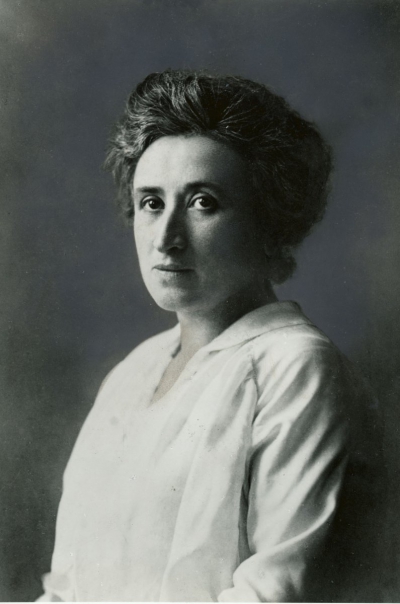The Spartacist uprising (German: Spartakusaufstand), also known as the January uprising (Januaraufstand), was a general strike and the accompanying armed struggles that took place in Berlin from January 5 to 12, 1919. It occurred in connection with the November Revolution that broke out following Germany's defeat in World War I. The uprising was primarily a power struggle between the Social Democratic Party of Germany (SPD) led by Friedrich Ebert, which favored a social democracy, and the Communist Party of Germany (KPD), led by Karl Liebknecht and Rosa Luxemburg, which wanted to set up an authoritarian Communist regime similar to the one established by the Bolsheviks in Russia. In 1914 Liebknecht and Luxemburg had founded the Marxist Spartacus League (Spartakusbund), which gave the uprising its popular name.
The revolt was improvised and small scale and quickly crushed by the superior strength of government and paramilitary troops. The death toll was roughly 150 - 200, mostly among the insurgents. The most prominent deaths were those of Karl Liebknecht and Rosa Luxemburg, who were murdered extrajudicially, almost certainly with the approval of the leaders of the provisional SPD-led government. The party's involvement hampered its position throughout the life of the Weimar Republic, although quashing of the uprising did allow elections for the National Assembly to take place as scheduled on January 19. The Assembly went on to write the Weimar Constitution that created the first functioning German democracy.
Rosa Luxemburg (Polish: [ˈruʐa ˈluksɛmburk] (listen); German: [ˈʁoːza ˈlʊksəmbʊʁk] (listen); Polish: Róża Luksemburg; also Rozalia Luksenburg; 5 March 1871 – 15 January 1919) was a Polish and naturalised-German revolutionary socialist, Marxist philosopher and anti-war activist. Successively, she was a member of the Proletariat party, the Social Democracy of the Kingdom of Poland and Lithuania (SDKPiL), the Social Democratic Party of Germany (SPD), the Independent Social Democratic Party (USPD), the Spartacus League (Spartakusbund), and the Communist Party of Germany (KPD). Born and raised in an assimilated Jewish family in Poland, she became a German citizen in 1897.
After the SPD supported German involvement in World War I in 1915, Luxemburg and Karl Liebknecht co-founded the anti-war Spartacus League (Spartakusbund) which eventually became the KPD. During the November Revolution, she co-founded the newspaper Die Rote Fahne (The Red Flag), the central organ of the Spartacist movement. Luxemburg considered the Spartacist uprising of January 1919 a blunder, but supported the attempted overthrow of the government and rejected any attempt at a negotiated solution. Friedrich Ebert's majority SPD government crushed the revolt and the Spartakusbund by sending in the Freikorps, government-sponsored paramilitary groups consisting mostly of World War I veterans. Freikorps troops captured and summarily executed Luxemburg and Liebknecht during the rebellion.
Due to her pointed criticism of both the Leninist and the more moderate social democratic schools of socialism, Luxemburg has had a somewhat ambivalent reception among scholars and theorists of the political left. Nonetheless, Luxemburg and Liebknecht were extensively idolized as communist martyrs by the East German communist government. The German Federal Office for the Protection of the Constitution asserts that idolization of Luxemburg and Liebknecht is an important tradition of the German far-left. Despite her own Polish nationality and strong ties to Polish culture, opposition from the PPS due to her stance against the creation of a bourgeois Polish state and later criticism from Stalinists have made her a controversial historical figure in Poland's present-day political discourse.

1919Jan, 15
Rosa Luxemburg and Karl Liebknecht, two of the most prominent socialists in Germany, are tortured and murdered by the Freikorps at the end of the Spartacist uprising.
Choose Another Date
Events on 1919
- 5Jan
Nazi Party
The German Workers' Party, which would become the Nazi Party, is founded. - 23Mar
Italian Fascism
In Milan, Italy, Benito Mussolini founds his Fascist political movement. - 4May
Treaty of Versailles
May Fourth Movement: Student demonstrations take place in Tiananmen Square in Beijing, China, protesting the Treaty of Versailles, which transferred Chinese territory to Japan. - 19May
Turkish War of Independence
Mustafa Kemal Atatürk lands at Samsun on the Anatolian Black Sea coast, initiating what is later termed the Turkish War of Independence. - 29May
General relativity
Albert Einstein's theory of general relativity is tested (later confirmed) by Arthur Eddington and Andrew Claude de la Cherois Crommelin.

 English
English  español
español  français
français  português
português  русский
русский  العربية
العربية  简体中文
简体中文 